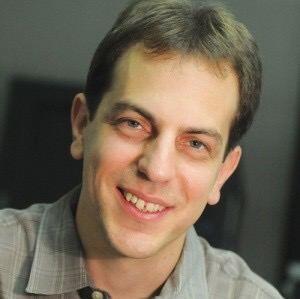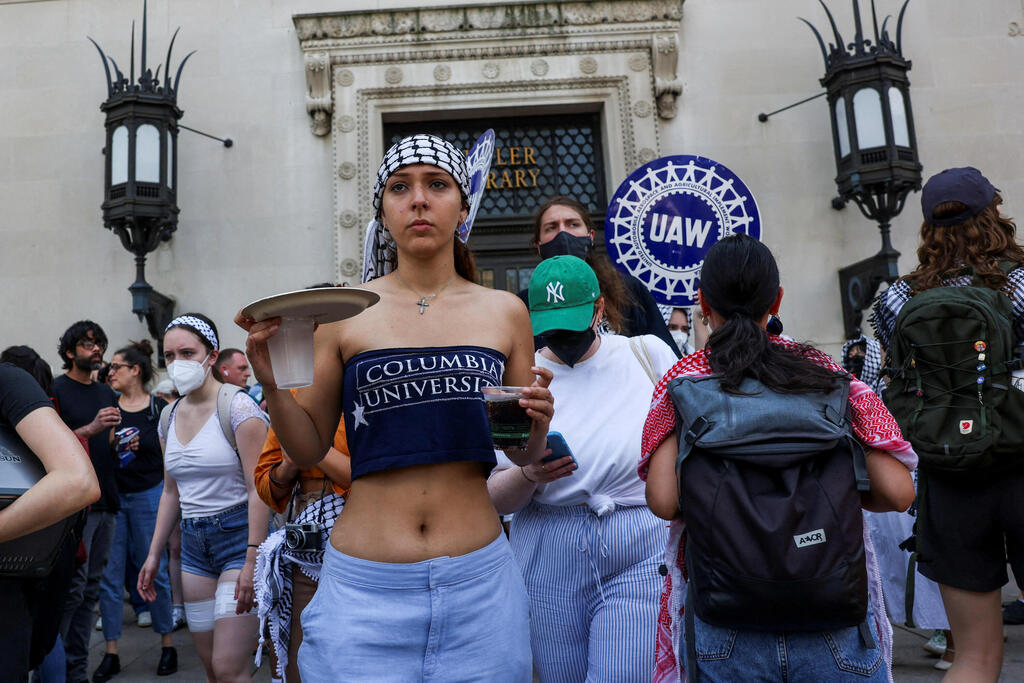Getting your Trinity Audio player ready...
On Tuesday, Columbia University announced that the students who took over the Hamilton Hall are now facing academic expulsion for the first time instead of issuing threats.
In the university's statement, it was written: "The work of the university cannot be endlessly interrupted by protesters who violate the rules. Continuing to do so will be met with clear consequences," said spokesperson Ben Chang. The university suspended Mahmoud Khalil, the student in charge of negotiating with the University who is also resigning in the U.S. with a student visa.
6 View gallery
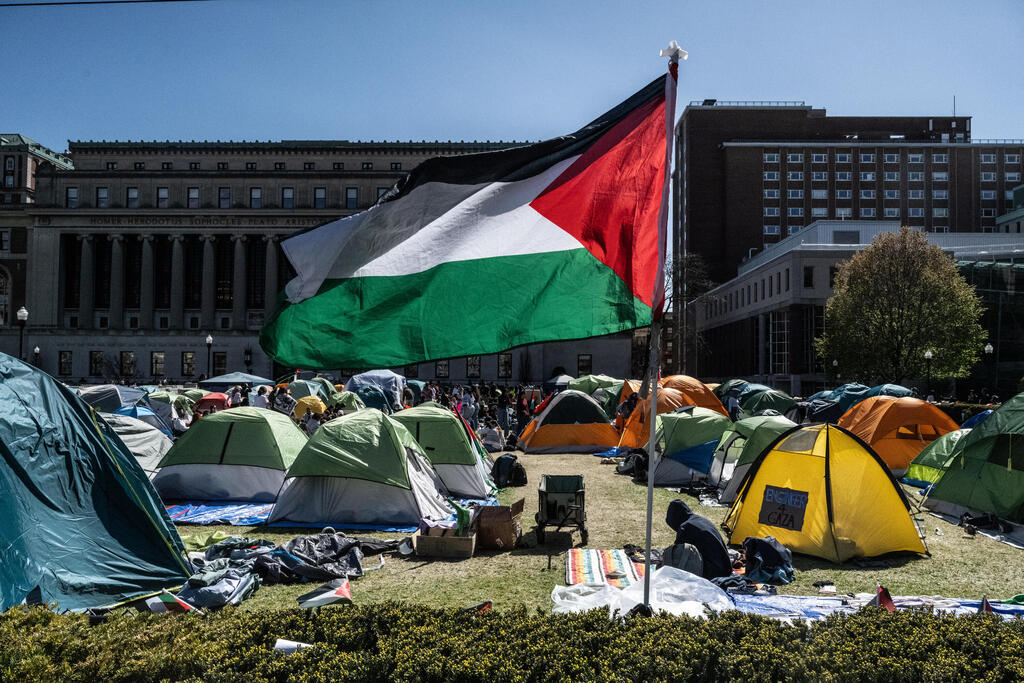

Gaza solidarity encampment in Columbia University
(Photo: Stephanie Keith / Getty Images)
Halil claimed that he does not represent the group of students who took over Hamilton Hall, which he called an autonomous group, and he still does not know their demands as they have not conveyed them to the protest participants.
Meanwhile, like many faculty and students at the university, Gil Zussman, a professor of electrical and computer engineering at the New York institution for the last 17 years, will not be sleeping tonight. "I spoke with Jewish students on campus and couldn't fall asleep due to excessive concern," he said.
"The most worrying thing was seeing people entering buildings through windows on the street. It's something that happened here in the past and didn't end well. The concern is that outsiders are coming in and it could escalate to violence. I have nine students, and I'm supposed to teach as usual, but it's very difficult under these circumstances. Some of my students are Jewish, some are Israeli, some live in dorms very close to the hall, and no one is sleeping tonight and we are in the middle of exams," he said.
According to Professor Zussman, the protesting students do not represent the university. "We have 30,000 students, and these protesters are a noisy minority that bothers everyone else. Most people are in labs or classrooms trying to study. This group does not represent the majority, but it certainly disrupts my activities, research, and teaching," he added.
6 View gallery
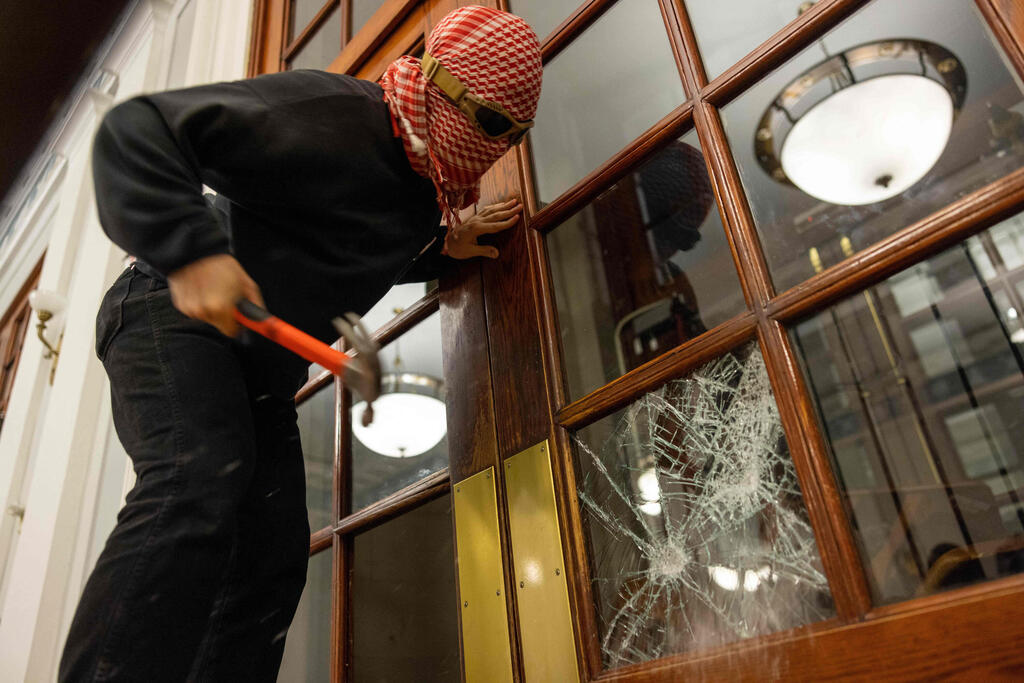

Pro-Palestinian protesters vandalizing Columbia University
(Photo: Alex Kent / GETTY IMAGES NORTH AMERICA / AFP)
"I haven't reached the point of giving up and leaving yet, but I think the university could have managed the situation better. The administration brought in the police, but they did it improperly and incompletely. They did half the work, and it led to another escalation. They removed one student, but there are still many who are there calling to harm Jews," he said.
"It should be understood, that unlike universities in Israel, Columbia is not built to deal with terror-focused people. There are people here willing to be arrested by the police, and facing disciplinary consequences doesn't deter them. Arrest is just another part of their life's resume. The campus is huge, and you can't lock it down. It's not just one gate; there are 20 gates here. It's not like in Israel, where there are guards and security", he said.
"Here, everything takes time. Look at how the security stood and still stands powerless against the protesters. Yes, we have security guards, but it took me time to understand that security companies here are not allowed to touch anyone. It's not like the police. The role of campus security guards is more or less to check that the laptops haven't been stolen, nothing like Israel," he added.
Do you think the police need to be brought back into the campus?
"I don't envy the president right now, it's not a simple situation. This time she can invite the police while consulting with the senate, but the important part here is explaining to the moderate members of the faculty, not the radicals. We need to explain that we are in an emergency, and ultimately, it will affect the university, funding, and student enrollment. You can't consistently bypass federal law and expect to leave unscathed."
"Calls for 'no Zionists on campus' are a federal offense of discrimination. People don't understand all the implications of this. The administration understands, but when the public isn't with you, it's very difficult to control such a crisis. It's hard to expel students, they are not alone. There's a whole system that has been built over decades, while professors like me were busy in the lab."
"These things don't happen overnight because three radical students were accepted to the university. It's a matter of years. And it's not just happening here, it's happening simultaneously at many universities in a very organized way, so there's a system here that was ready for it."
6 View gallery
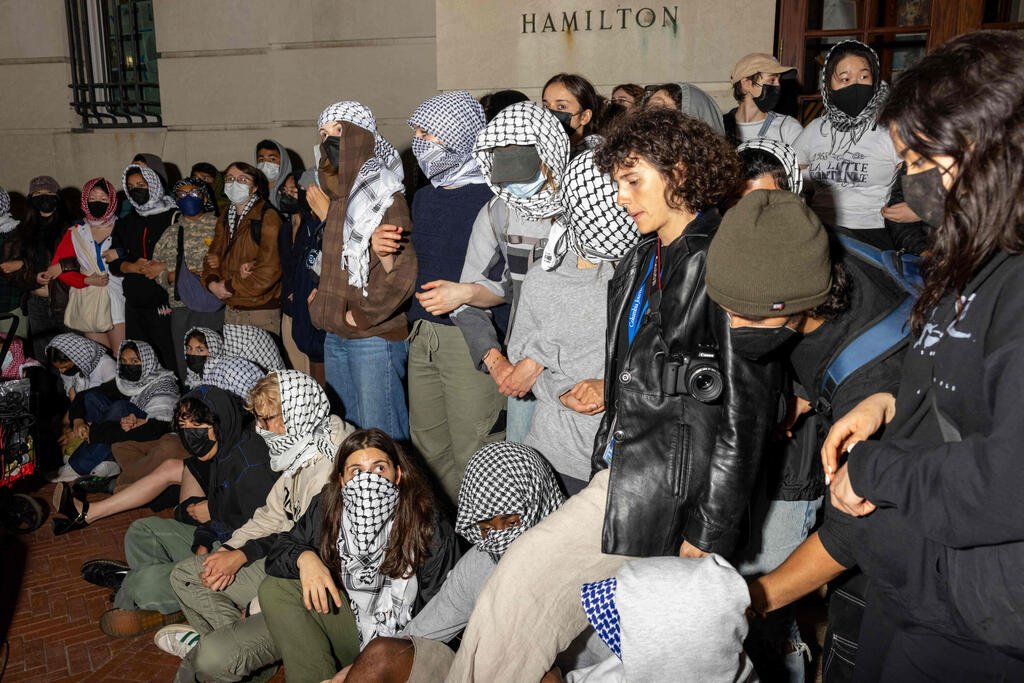

Students don't know the consequences for their actions
(Photo: Alex Kent / GETTY IMAGES NORTH AMERICA / AFP)
And yet, global attention is focused specifically on you at Columbia.
"Much of this happens because we're an urban campus; you can bring people from the city to the campus outskirts and create external pressure on the university. It's also because we're very exposed to the media. If a reporter from the Wall Street Journal or the Times needs to come here, it's easier to come to Columbia's campus than to Princeton's or Yale's. So all these contribute to the outbreak."
Professor Zussman has experienced several student protests and takeovers of the Hamilton Hall, but he says this time it's different. "We've seen similar incidents, but not on this scale," he said. "What's unique this time is that the protest is directed at people on campus, not just the university itself. It's aimed specifically at Jews as they explicitly say. They don't want people who served in the IDF, they don't want Zionists on campus. This is religious discrimination, and it has been happening consistently for a few months at the university. It's something unique to the current protest and makes it very difficult to handle."
According to Zussman, one of the most worrying factors in the current protest is the faculty members. "Just yesterday, we saw the group of faculty members in orange vests guarding the entrance to the tent. There's a small group of 30-40 very extreme faculty members who took the university hostage with the help of students," he explained.
"What bothers many of us at the university the most is that these faculty members take fairly naïve students and push them to take extreme risks that will affect them for the rest of their lives. If you're arrested by the New York Police Department, it stays with you for life, while faculty members will continue their lives without consequences. Many of them have tenure; they can't lose their positions, they're secure. It's a small but very active group, and they harm students who are not truly aware of the consequences of their actions. The fact that faculty members are heavily involved makes it difficult for the university to deal with the matter because they also see it as an issue related to the faculty's freedom of expression," he concluded.



